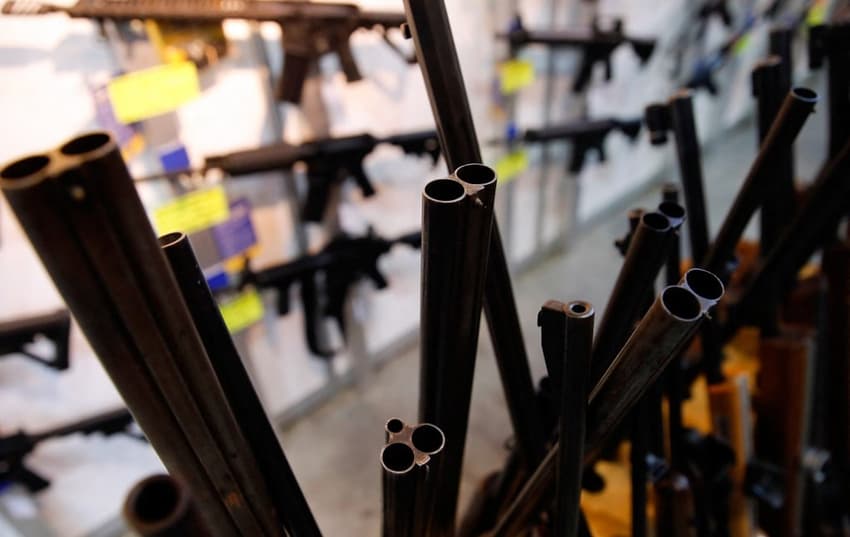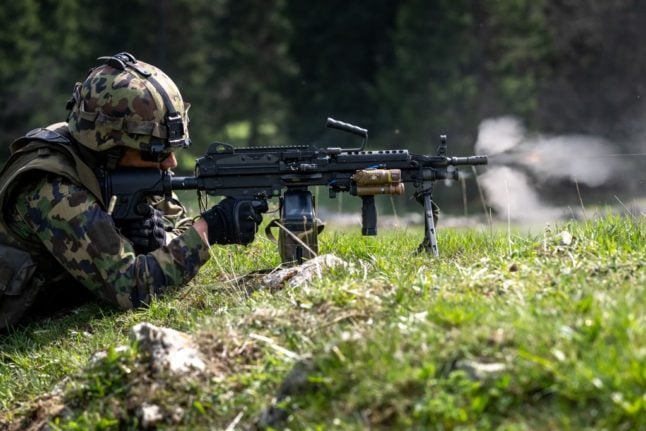Why you might hear gunfire in your Swiss neighbourhood

One thing you should get accustomed to while living in Switzerland is the sound of gunfire.
This may sound like a paradox in this neutral and peace-loving country, but it is nevertheless true.
Right now and throughout the summer, you may be hearing gun shots in your area, especially in you live in a small or rural community. And depending on where you are, the sound of gunfire may blend harmoniously with the ringing of cow bells — what could be more ‘Swiss’ than that?
You will notice, however, that nobody here is alarmed, and you shouldn’t be either: it is just the Swiss doing what comes naturally to them: firing their weapons.
Why exactly is sharpshooting ‘natural’ for the Swiss?
All able-bodied Swiss men from the age of 18 until 30 are required to serve in the armed forces or in its alternative, the civilian service.
The soldiers who have been issued an assault rifle must complete a shooting exercise every year until they are discharged from military duty.
This usually takes place in spring and summer, which may explain why you are hearing the sounds of gunfire now, especially if you live within the hearing range of a military base.

Swiss soldier fires a machine gun during a shooting exercise. Photo by Fabrice COFFRINI / AFP
Then, there are also numerous civilians who practice target shooting as a hobby.
There are plenty of gun clubs throughout the country where people of all ages — including children as young as five — can hone their sharpshooting skills. These clubs are grouped under the umbrella organisation, the Swiss Target Shooting Federation.
This may sound shocking to some, but in fact, firing guns in Switzerland — whether by soldiers or civilians — is all about safety.
The Swiss learn to shoot from an early age, and develop a deep sense of responsibility toward their firearms, which accounts for the relatively low (in comparison with other countries) rate of gun violence.
However, mishaps sometimes do happen:
READ ALSO: Swiss soldier fined after 'forgetting' about gun in car
Youngsters can show off their (safe and responsible) skills during shooting festivals, including Knabenschiessen, the world's largest youth rifle competition for 12 to 16-year-olds held in Zurich every September.
This video is a humorous though factual take on Switzerland’s gun culture.
Who is allowed to own a firearm in Switzerland, and under what conditions?
You can own a gun if you are a Swiss citizen and are at least 18 years old; are mentally stable; there is no reason for authorities to believe you may use the weapon to harm yourself or others; and have no criminal record indicating you pose a danger to public safety.
A permit is needed to own a weapon.
A written contract between the seller and buyer, as well as the weapon being sold / purchased must be established.
And If the weapon is a firearm, the seller must send a copy of the contract to the buyer’s cantonal firearms office within 30 days of concluding the contract.
READ ALSO: How to explain Switzerland's obsession with guns
Can foreigners own a gun and participate in target shooting practice?
If you have a C permit, your rights to own and use a firearm are the same as for the Swiss (see above).
Others are subject to stricter rules, according to the Federal Office of Police (Fedpol):
"Foreign nationals who do not possess a long-term residence permit require a weapons acquisition permit for all types of weapons and their essential components. They must also have an official certificate from their canton of residence or country of origin confirming that they are authorised to acquire the weapon or main components."
Citizens of certain countries, however, are not allowed to acquire weapons or essential components.These countries are: Albania, Algeria, Bosnia and Herzegovina, Kosovo, North Macedonia, Serbia, Sri Lanka, and Turkey.
The reason for the exclusions is that “there have been ethnically or politically motivated confrontations in Switzerland between members of the warring factions from these countries (or there is a real risk of confrontation),” according to Fedpol.
Comments
See Also
This may sound like a paradox in this neutral and peace-loving country, but it is nevertheless true.
Right now and throughout the summer, you may be hearing gun shots in your area, especially in you live in a small or rural community. And depending on where you are, the sound of gunfire may blend harmoniously with the ringing of cow bells — what could be more ‘Swiss’ than that?
You will notice, however, that nobody here is alarmed, and you shouldn’t be either: it is just the Swiss doing what comes naturally to them: firing their weapons.
Why exactly is sharpshooting ‘natural’ for the Swiss?
All able-bodied Swiss men from the age of 18 until 30 are required to serve in the armed forces or in its alternative, the civilian service.
The soldiers who have been issued an assault rifle must complete a shooting exercise every year until they are discharged from military duty.
This usually takes place in spring and summer, which may explain why you are hearing the sounds of gunfire now, especially if you live within the hearing range of a military base.

Then, there are also numerous civilians who practice target shooting as a hobby.
There are plenty of gun clubs throughout the country where people of all ages — including children as young as five — can hone their sharpshooting skills. These clubs are grouped under the umbrella organisation, the Swiss Target Shooting Federation.
This may sound shocking to some, but in fact, firing guns in Switzerland — whether by soldiers or civilians — is all about safety.
The Swiss learn to shoot from an early age, and develop a deep sense of responsibility toward their firearms, which accounts for the relatively low (in comparison with other countries) rate of gun violence.
However, mishaps sometimes do happen:
READ ALSO: Swiss soldier fined after 'forgetting' about gun in car
Youngsters can show off their (safe and responsible) skills during shooting festivals, including Knabenschiessen, the world's largest youth rifle competition for 12 to 16-year-olds held in Zurich every September.
This video is a humorous though factual take on Switzerland’s gun culture.
Who is allowed to own a firearm in Switzerland, and under what conditions?
You can own a gun if you are a Swiss citizen and are at least 18 years old; are mentally stable; there is no reason for authorities to believe you may use the weapon to harm yourself or others; and have no criminal record indicating you pose a danger to public safety.
A permit is needed to own a weapon.
A written contract between the seller and buyer, as well as the weapon being sold / purchased must be established.
And If the weapon is a firearm, the seller must send a copy of the contract to the buyer’s cantonal firearms office within 30 days of concluding the contract.
READ ALSO: How to explain Switzerland's obsession with guns
Can foreigners own a gun and participate in target shooting practice?
If you have a C permit, your rights to own and use a firearm are the same as for the Swiss (see above).
Others are subject to stricter rules, according to the Federal Office of Police (Fedpol):
"Foreign nationals who do not possess a long-term residence permit require a weapons acquisition permit for all types of weapons and their essential components. They must also have an official certificate from their canton of residence or country of origin confirming that they are authorised to acquire the weapon or main components."
Citizens of certain countries, however, are not allowed to acquire weapons or essential components.These countries are: Albania, Algeria, Bosnia and Herzegovina, Kosovo, North Macedonia, Serbia, Sri Lanka, and Turkey.
The reason for the exclusions is that “there have been ethnically or politically motivated confrontations in Switzerland between members of the warring factions from these countries (or there is a real risk of confrontation),” according to Fedpol.
Join the conversation in our comments section below. Share your own views and experience and if you have a question or suggestion for our journalists then email us at [email protected].
Please keep comments civil, constructive and on topic – and make sure to read our terms of use before getting involved.
Please log in here to leave a comment.